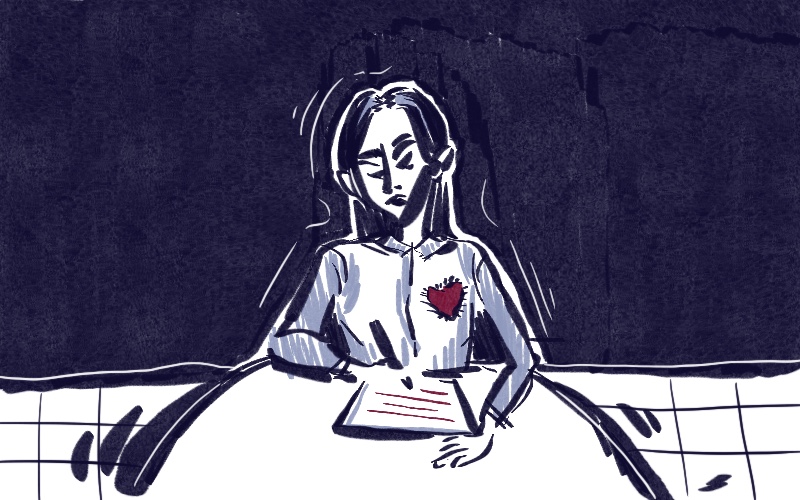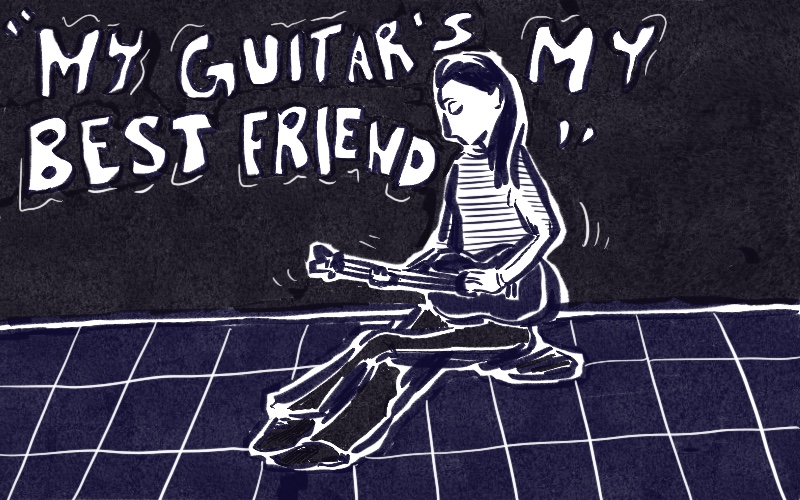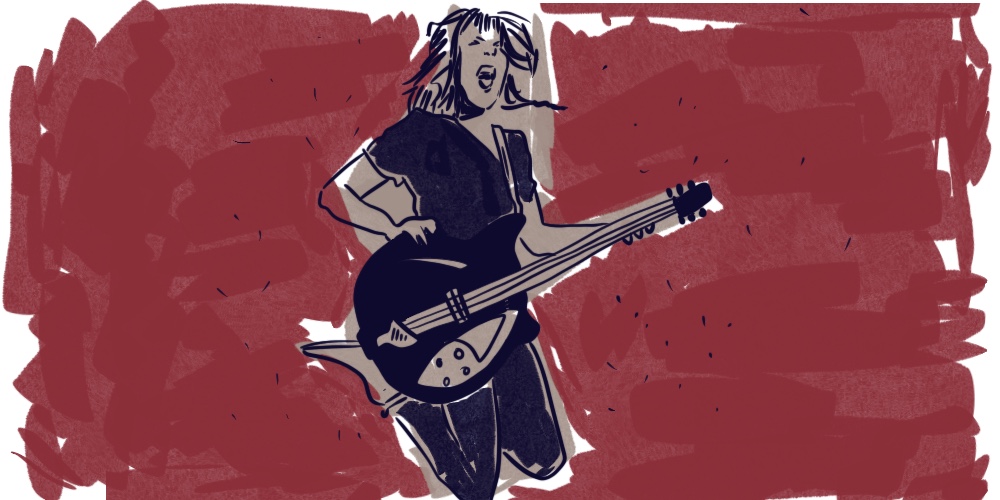Lilly Hiatt’s music first found me by way of WXPN’s airwaves. In August 2017, I fled NYC for my hometown in Central PA, nursing spiritual and physical wounds from my latest emotional monsoon. A recent week-long bender had concluded with me quitting therapy and taking up self-harm instead. Scabbed remnants of the injuries on my arms and legs turned to scar tissue while my 2001 Saturn with manual locks and windows crawled towards the end of Cameron Street. There, an ad for Hiatt’s Trinity Lane proclaimed itself over my speakers, bits of the album’s title track sprinkled throughout the sonic copy stating its connection to her sobriety. “I get bored so I wanna get drunk,” Hiatt famously opens on the banger.
I didn’t know artists could be sober. That knowledge found its home amongst some latent crevice in my mind, where it laid in wait.
Lillian Alice Hiatt was born in 1984, the daughter of famed singer-songwriter John Hiatt and film sound editor Isabella Wood. Hiatt’s mother passed away around her first birthday. The child grew up on a farm in Nashville, Tennessee with her father, his wife, and her two siblings. Though Hiatt has been playing music for most of her life, popular accounts of her career take off in 2017 with Trinity Lane, her third full-length endeavor.
The artist’s own biography states that “In 2017, she released Trinity Lane, a commercial and critical breakout that helped establish her as one of the leading voices to emerge from the embarrassment of musical riches that is East Nashville.” Produced by Shovel & Rope’s Michael Trent, Rolling Stone called Trinity Lane “the most cohesive and declarative statement of the young songwriter’s career,” ushering Hiatt into a new tier of professional acclaim.
Some experts state that charisma stems from dichotomies. Hiatt boasts contradictions in spades, starting with her speaking voice — delicate, lilting, and somewhat antithetical to the brassy, bold tone she sings with. Her music steals my synapses with stories of specific inner turmoils that resonate with my own. Some of these are predictable, like the themes of lost love present on tracks like “Different, I Guess.” Others are slightly more specialized, if still archetypal, like “See Ya Later,” an anthem for proud women cutting their losses. Out of all the songs on Trinity Lane, though, “All Kinds of People” was the first to hit me hard. To this day, it reminds me of all the strangers who lent me their kindness while I struggled with my active alcoholism, and how even their authentic gestures were still too superficial to sustain me, given their fleeting nature.
Hiatt holds no responsibility for the version of herself extant in my mind. It was her songs, instead, that mothered me through difficult patches in my early-adulthood development. I began our interview by placating the elephant in the room, thanking her for everything her music has helped me through in an attempt to alleviate the mounting pressure of my own fangirl energy.
As an artist, Hiatt’s real capabilities spring from a sense of balance. Strength and softness are not mutually exclusive — the spectrum is more like a circle than a segment. She possesses a seasoned but raw emotionality able to withstand itself. Her artform, songwriting, serves as the medium, carving a safe distance from which she can logically regard her feelings and transform them into something new. “If something’s burning in my heart, I need to write it out,” Hiatt explained. “Sometimes it’s just a heartache about a person that I love. Other times it’s a heartache about the state of the world. Usually, it’s a bit nuanced in that I’ve learned the most from conversations with people.”

Hiatt’s very first go at songwriting came in sixth grade, when her chorus class began learning elementary keyboard concepts. This education evolved into a fuller form during high school. “I wrote before then, but that’s when I started having whole songs come together,” Hiatt noted. Words were a meaningful outlet for experimentation and catharsis — Hiatt shared her affinity for specific books like The Catcher in the Rye, A Confederacy of Dunces, and Of Mice and Men, amongst additional works by Kurt Vonnegut and Sylvia Plath. Through it all, though, songwriting remained her preferred art form.
The fledgling musician and prodigal daughter moved to Denver for college in 2002. “I didn’t go to the music school, but I hung around these kids that did, and we started a band together,” she recalled. Hiatt majored in psychology, but she recounted how she started recording demos on a mini-disc system her parents had gifted her for Christmas. “Word got out with one of my friends that I had made these little songs and they were cool,” she said. Hiatt and her music school friends formed her first band, a greater whole united by its voracious appetite for music.“We were making music without any total direction, honestly. It was fun,” she smiled.
Four records later, Hiatt’s creative process still emphasizes curiosity, the bravery to relinquish fluid iotas of control. When practicing her own songwriting, she allows each song’s themes to take shape on their own time. Hiatt picks up her guitar every day, but she doesn’t coerce herself into creating. “I feel very close with my guitars,” she explained. “There have been times in my life where I’ve looked at them like, ‘Oh, you’re taunting me, because you’re telling me I need to write.’” By this point, she understands her own rhythm’s ebbs and flows — there’s a time for living and a time for synthesizing. A time to fill the cup and a time to drink from it.
I first quit drinking on December 16th, 2017, relapsed for two months around Labor Day the next year, and then returned to abstinence on September 23rd, 2018. Since then, I’ve found an acceptance of my own in the understanding that my mind will forever remain a hostage to its own thirst for escape. Writing is a method of satiating that desire without sacrificing my existence.
Now two years away from my second sobriety date, gaining strength and clarity with each successive day, I can see the bigger picture taking shape, the inner changes this safe space has fostered. I see parallel revelations finding their form throughout Hiatt’s expanding oeuvre, especially with her latest album, Walking Proof, which released on March 27th, 2020.
Hiatt’s biography continues to state that although she was grateful for the critical acclaim Trinity Lane received,
the collection came from an emotionally challenging place, and Hiatt found herself frequently revisiting the hurt and struggle that inspired it as she spoke candidly to press about her painful breakup, her struggles with sobriety, and the overwhelming sadness of her mother’s suicide. Rather than succumbing to the weight of it all, though, Hiatt managed to emerge stronger and more serene from the experience, treating it as a foundation from which she could begin the essential work of re-examining her relationships with herself and the world around her.
This natural and very personal inner-shift imbues Walking Proof with a lighthearted sheen that’s garnered its own brand of acclaim. Hiatt’s latest LP made strong showings in reviews by Slant Magazine, Rolling Stone, and Pitchfork. Paste Magazine named Walking Proof one of their Top 25 Albums of 2020 (So Far), raving that “This is music to liberate yourself to — music that reminds listeners of Americana’s versatility as a genre and the palliative effects a good, expressive rock song can have on the soul.”
Certain writers might posit that this powerful effect springs from Hiatt’s deep willingness to let in little moments of joy, which flower across Walking Proof’s eleven tracks. Hiatt illustrates her blossoming optimism with resilient lyrics like this stanza from “Brightest Star”: They get cruel, that’s how it goes / Don’t pay it any mind / ‘Cause you’ve got a thing nobody else has / So just shine
Joy follows acceptance, and Hiatt’s relationship to her craft exemplifies her commitment to this principle. “I used to only pick my guitar up when I was gonna write,” she said. Since then, she’s accepted the importance of joy for its own sake. “The guitar’s my friend,” Hiatt continued. “When I’m freaking out, if I pick up a guitar, there’s no doubt that I’ll calm down. It’s something to do with my hands. It’s something to focus my mind on. It resonates with my heart and soul.”

That’s how I regard her music, a place that grounds me through the storm. I use music to become the person I need to be. Rappers like Big Boi give me the gumption to pursue goals that scare me. Music from Caribou puts me in touch with the most powerful truths innate to the human condition. But Lilly Hiatt and her musical cohorts typically stick to simplicity — solid instruments, heartfelt lyrics that surrender their defenses. They give me something real to stand on.
Genuine strength is an undeniable facet of Hiatt’s sound, which wants to be called country upon impact before emulsifying in the atmosphere, marrying elements of indie rock, folk, blues. It’s hard to isolate and name which particular attributes of her style create this aura, at once carnal from its rock n’ roll, nostalgic from its country, and heart-wrenchingly vulnerable from its singer-songwriter elements.
Hiatt herself told me she’s always struggled with sticking to one genre. “I never really know what to say,” she pondered. “I’ve tried different things. I’ve said ‘country rock’ or I’ve said ‘indie.’ Americana fits. Americana can mean so many things.” Across the internet, music journalists have sought to understand Hiatt’s distinct magic by pinning a name on it. Oftentimes, they also settle on Americana. Perhaps, more than anything, a sense of melancholy unites this subgenre of country music that Hiatt’s work evokes — the Cash variety crossed with The Dixie — I’m sorry — The Chicks. Hiatt recalled a Liz Phair interview she’d read recently. “I don’t turn to my guitar when I’m happy,” she paraphrased. “I’m a dark writer. I turn to it when I’m upset or sad or stressed.”
Phair’s quote found fervent resonance with the promising songstress. “When I feel that anger and when I don’t know where to put it, it is so relieving to be like, ‘You can write a song right now. Even if it’s not that great, you get it out,’” Hiatt said. It goes like this: “Usually I hold my guitar, I play a little something, and I’ll find a melody. The melody comes and then I’ll sing something to that melody. Sometimes it doesn’t even make sense to me why I’m singing it, but it’ll kind of kick off where the song is going. Then it takes flight.”
Once the song exists — it’s written, recorded, and released — Hiatt takes it on the road. She understands that at this stage, the work no longer belongs to her alone, no matter how personal it is. She compared performing to a momentary symbiotic relationship between her and the audience. “How they’re interpreting it and the energy coming from that interpretation, which can be felt, is a huge part of the song,” Hiatt explained.
Certain songs, like Trinity Lane’s “Records,” strike a consistent chord. “It’s a love song to music and that’s why we’re usually all at the show, because we love music,” she said. Hiatt cited “The Night David Bowie Died” as another example. “It’s kind of heavy. People like that, and I like to play it.” While the songs feel different each night in front of each crowd, the originating sensations remain ever-present. “I never lose that feeling of how I felt when I wrote the song,” Hiatt said. “I can start to relate to it differently, but I always remember exactly how I felt when I wrote it. I go back to that place a lot of the time when I’m performing.”
Prolonged efforts to attach Hiatt’s hard-won magic to one genre risk tarnishing this radiant authenticity. Her success thus far doesn’t lie in her mastery over the musical medium, even though that mastery is an ever-intensifying reality. Instead, her success relies upon the unrelenting authenticity occupying her creative practice’s core. “We’re embarking upon this revolutionary time going into the 2020s,” Hiatt remarked. “We’re having to confront a lot of things. We’re gonna have to rebuild some things. I think walls are being knocked down in a lot of ways, or that’s my hope.” Maybe the need for superfluous labels could fall by the wayside.
“It’s exciting to me when somebody shakes it up constantly, but stays true to their muse,” Hiatt explained, speaking to her hope for an increased openness across the music industry. “At this time where so much is changing, we should just be open to experimentation and doing what feels good and seeing what works for a new future.” If this enterprise consistently commits itself to the source, to genuine emotion, art might help society at large contend with its deepest desires and most harrowing fears.
Emotion is it. The strength I glean from Hiatt’s work isn’t a product of her music, it’s the music itself. Creativity, as an energetic force, ultimately comprises the true route to grounding. Hiatt’s own words support the claim. As we embark upon this much-awaited New Year, she pontificated upon the purpose of music. “I think the responsibility of music is to make people feel something,” Hiatt decided. “I don’t expect anything from music other than to just be there for me when I want to hear it.” When I need Hiatt’s magic, it’s there.
I shared my personal experiences with Hiatt at the beginning of our interview to clear out some space for genuine conversation. In my assumption that she hears such flattery every hour, I sought to simply get it out of the way. As we closed our discussion, Hiatt offered one final elaboration upon her craft’s utility.
“If it can bring any sort of relief to anyone, that makes me really happy. That’s what I love to see. What you told me at the beginning of our interview, that means a lot to me. That’s one of the main reasons I’m doing this — it’s a way that I feel connected to people. I create a lot of stuff for myself, but also, there’s an act of service involved in it for me. I want to make you feel better. I want you to hear this, and I hope that makes you feel better somehow, or feel empowered.” •




